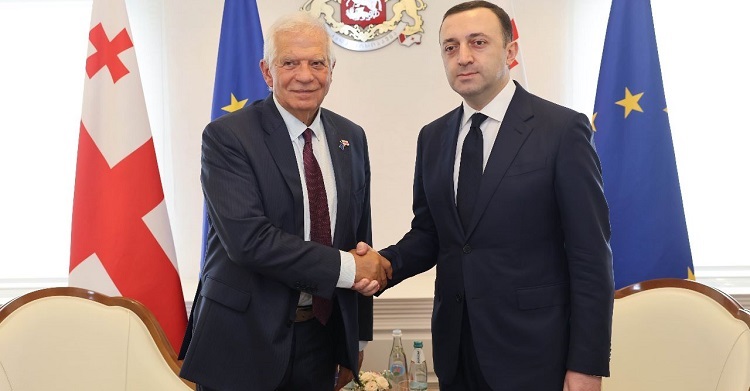Borrell says “no doubt” Georgia belongs to European family in “key messages” for visit

Georgian PM Irakli Garibashvili on Friday hosted Josep Borrell, the European Union High Representative. Photo: Government press office
Josep Borrell, the European Union High Representative on a visit to Georgia, on Friday stressed “Georgia no doubt belongs to European family”, before revealing the bloc’s “key messages” ahead of its decision later this year on whether to grant Tbilisi its candidate status.
In a press briefing with the country’s Prime Minister Irakli Garibashvili, the EU official stressed he wanted to “personally convey this message” while on his first trip to the country, noting he had seen a “very strong spirit of the Georgian people” to join the bloc.
Eighty percent of Georgians support joining the EU - this is an impressive number, but it is not just a number. I am very glad that many European flags are flying in the streets of Georgia and Tbilisi. I should say they are even more than in Brussels”, he said.
Another of Borrell’s messages highlighted the need for unity of “all political forces” in the country for Georgia’s EU integration, with the High Representative saying the integration process was a “joint effort” and that the Government and the ruling party carried the “main responsibility” to create possibilities for cooperation.
At this stage, all efforts should be focused on reducing political tensions. This political and historical opportunity should not be lost, and you should work together for this, because further steps on the European path will depend on merits and results achieved, and the result will be achieved on the basis of joint efforts”, he said.
 Borrell launched his press briefing with Prime Minister Irakli Garibashvili in Tbilisi by expressing condolences to a family of a minor killed in western Georgia after landslides hit Guria and Adjara regions on Thursday and early Friday. Photo: Government press office.
Borrell launched his press briefing with Prime Minister Irakli Garibashvili in Tbilisi by expressing condolences to a family of a minor killed in western Georgia after landslides hit Guria and Adjara regions on Thursday and early Friday. Photo: Government press office.
The EU official noted Georgia had “fully completed” three of the 12 recommendations of the bloc to obtain the candidate status, and added “time still remained” to meet the conditions that were partially met or unfulfilled.
He stressed “depolarisation, deoligarchisation, political, economic, social, judicial, electoral reforms, media pluralism and human rights” as first priorities, adding “there is no shortcut to accomplishing this - it all requires a lot of hard work, political will and a clear commitment to EU values”.
The EU representative said actors in Georgia should resolve the problem of the polarised political scene, noting the impeachment procedures announced by the ruling Georgian Dream party against President Salome Zourabichvili this week for her unauthorised foreign visits could further exacerbate the atmosphere.
Borrell highlighted the work for the bloc’s membership as being “worth it” for not only the EU candidate status but also “improvements in [Georgian] citizens’ daily lives”.
Had a timely exchange with Prime Minister @GharibashviliGe.
— Josep Borrell Fontelles (@JosepBorrellF) September 8, 2023
I passed 3 messages:
- Georgia belongs to the European family. Time must be used wisely now to advance reforms.
- We welcome Georgia’s support to Ukraine.
- EU’s unwavering support to Georgia‘s territorial integrity. pic.twitter.com/d2B6HbVHa2
Speaking about foreign policy priorities, the EU official emphasised the bloc’s support for Ukraine in its ongoing fight against Russian invasion, and stressed “our most close allies should work in coordination on the international level to isolate Russia”.
In this note, Borrell condemned the recent resumption of direct flights between Russia and Georgia, but noted he welcomed “close cooperation [with the Georgian Government] aimed at countering sanctions evasion by Moscow”.
He also rejected claims voiced by several former or current members of the ruling party about the West’s efforts to “drag” Georgia into the ongoing Russia-Ukraine conflict as “part of Russian propaganda”, which he claimed was “strong” and adding “no one would think” of a scenario.
Reiterating the EU’s support for Georgia, Borrell said the bloc had “never abandoned and will never abandon Georgia”, but noted the integration process would be “merit-based”.
 Tweet
Tweet  Share
Share